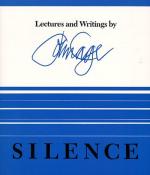
|
| Name: _________________________ | Period: ___________________ |
This test consists of 5 multiple choice questions, 5 short answer questions, and 10 short essay questions.
Multiple Choice Questions
1. "Edgard Varese" was first published in what publication?
(a) Muzica Moderna.
(b) Musical Traditions.
(c) Nutida Musik.
(d) Critical Musicology Journal.
2. What grade was Cage in when his dad mentioned a trip to another country, which never happened?
(a) 3rd.
(b) 4th.
(c) 6th.
(d) 5th.
3. "Edgard Varese" was first published in what year?
(a) 1949.
(b) 1948.
(c) 1958.
(d) 1961.
4. What grade did Cage get in a college class the first time he wrote in the manner of Gertrude Stein?
(a) B.
(b) F.
(c) C.
(d) A.
5. The essay "Composition: To Describe the Process of Composition Used in 'Music of Changes' and 'Imaginary Landscape No. 4'" was originally published in what year?
(a) 1952.
(b) 1947.
(c) 1945.
(d) 1939.
Short Answer Questions
1. In what month were all three parts of "Composition as Process" given?
2. In what state was "Composition: To Describe the Process of Composition Used in 'Music for Piano'" first printed in English?
3. "Forerunners of Modern Music" was first published in what journal?
4. Who accompanied Cage and eight children on a trip to a zoo?
5. One of the questions Cage asked in "Composition as Process--3" was if anyone had seen this man lately?
Short Essay Questions
1. Why does Cage say that compositions indeterminate with respect to their performance are by definition experimental?
2. How did painter Willem de Kooning respond when asked what painters of the past had influenced him?
3. In "Experimental Music: Doctrine," how does Cage respond when asked what he had to say about rhythm?
4. Describe the anecdote used at the conclusion of "Composition as Process--2: Indeterminacy" about Dr. Suzuki.
5. How does Cage go about exploring the work of each composer he mentions in "Composition as Process--2: Indeterminacy"?
6. How does Cage feel about writing his article about Erik Satie, as portrayed in the article?
7. In the book's Foreword, how does Cage describe the way the writings and lectures in his book are written and presented?
8. How does Cage describe the process by which he created a piece of music scored for twelve radios?
9. What does Cage comment on in the article "Forerunners of Modern Music"?
10. What does Cage say about Varese in relation to the present nature of music?
|
This section contains 755 words (approx. 3 pages at 300 words per page) |

|




